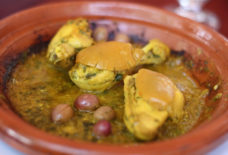Baklava 101: Syracuse-Area Church Teaches the Secrets to Homemade Arabic Desserts
SOURCE: SYRACUSE. COM
BY: JACOB PUCCI
ONONDAGA, N.Y. – The group of around a dozen is far smaller than the estimated 12,000 people who flock to St. Elias Antiochian Orthodox Church for the church’s Middle Eastern Festival, but like the annual summer fest, food remains the focus.
Every October for at least the past 25 years, the church on Onondaga Hill has taught cooking classes to those looking for a taste of homemade Middle Eastern cuisine.
This year’s theme is dessert. Rita Alghattas is typically in charge of making the S-shaped buttery shortbread graibeh cookies at the festival, but this Tuesday evening, she’s teaching baklava.
Alghattas learned to make the flaky dessert soon after she arrived in the United States from her native Jordan in the late 1980s. She never needed to make her own baklava in Jordan, as it was ubiquitous at bakeries. With baklava far less common in Syracuse, Alghattas realized she would need to learn to make her own and thus learned the dish from an aunt. She’s been teaching various cooking classes at St. Elias for the last six or seven years.
What’s the trick to excellent baklava? It’s all about the butter.
In particular, premium, high-fat butter. Alghattas uses bright yellow Kerrygold. But first, the butter must be clarified, or removed of its water and milk solids. To do this, Alghattas gently melts the butter—unsalted—in a saucepan large enough that the foaming butter won’t overflow. With the butter she adds a spoonful of uncooked bulgur wheat. The grain, she said, soaks up the milk proteins that sink to the bottom of the pot as the butter cooks. After the water boils off, you’re left with clarified butter and a rich treat for the cook.
Baklava can be rolled, layered in sheets or spun into bird’s nests. They’re often filled with ground nuts—Alghattas said pistachio is her favorite. For this class, she made rolled baklava filled with walnuts. She starts with two sheets of phyllo dough, brushed with the clarified butter. Phyllo dough is available in various thicknesses, but for baklava, thinner is better. Alghattas uses No. 4 phyllo dough for her baklava—typically the thinnest available in stores.
She adds two more sheets on top. She then adds the ground walnuts and rolls the baklava into a narrow log. She slathers more butter on the roll, cuts them on a bias into diamonds—the traditional shape, Alghattas said—and bakes it in a 350-degree oven. It takes around 20 to 25 minutes for the lightly toasted, golden brown appearance Alghattas is looking for.
Once the baklava is out of the oven, Alghattas pours sugar syrup on top. She said the Jordanian tradition is to use sugar syrup, not honey, and to flavor it slightly with rose or orange blossom water. It’s a thick syrup, made with two parts white sugar to one part water, that’s boiled until it’s nearly as viscous as corn syrup.
While the syrup is still tacky, Alghattas sprinkles a little pile of ground pistachios on each piece of baklava.
Not a concern on this crisp autumn evening, but in more humid weather, Alghattas would store her finished baklava in the oven to prevent it from turning soggy.
Alghattas and her husband, Nabeel, own Hawley Market, a long-running corner store and take-out restaurant on the outskirts of the city’s Hawley-Green neighborhood. In 2018, the store was one of three such shops in Syracuse to be recognized for its healthy food offerings as part of a program led by the Onondaga County Health Department and Trinity Health’s Transforming Communities Initiative.
Alghattas doesn’t sell baklava at the store—too much time and expense and not enough demand, she said—but her fellow parishioners raved about her homemade chocolate chip and peanut butter cookies.
The Antiochian Women of St. Elias Church’s Arabic cooking classes are held every Tuesday from 7 to 9 p.m. for the month of October. Registration is $20 per class and may be done online through EventBrite. Click here to register.
Jacob Pucci finds the best in food, dining and culture across Central New York. Contact him by email at jpucci@syracuse.com.









